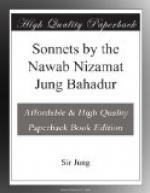But Truth, has many faces; and scarcely any poet (except perhaps Shakespeare) has come within measurable distance of expressing every aspect of the human character. The Nawab could take pleasure in reading poets as temperamentally dissimilar as Shelley and Scott, Spenser and Byron,—to name only a few. Shelley, who was a spirit utterly unable to understand this world or ordinary homespun human nature; and Scott, who not only comprehended both without an effort, but who combined the practical and the romantic elements successfully in his own life, A devotion to Spenser, “the poet’s poet,” the poet of a dreamy yet very real and living chivalry,—Spenser who used to forget himself in his creations,—did not prevent the Nawab from understanding Byron, who never could forget himself at all; and who, with all his vivid impulses of generous sympathy for the oppressed, is nevertheless generally classed to-day as a colossal egoist. (Unjustly so, for no mere egoist would have toiled as he toiled for Greek emancipation, in the nerve-racking campaign which cost him his life.)
In India to England—most characteristic of the war poems of Nizamat Jung—we see traces of the influence of more than one of the English poets he has read so lovingly. But the poem is none the less poignantly personal. The same may be said of the Sonnets here prefaced; for although they are related to the sonnets of earlier poets whose work must be familiar to the writer, yet they are in no sense imitations, nor are they echoes.
“Poetry is the natural language of strong emotion,” the Nawab said many years ago;—and if it may be asked why, holding this view, he has chosen such an elaborate (and, some people might add, artificial) form as the Sonnet, we can only answer that when an emotion or conviction is deep-seated and permanent, it becomes clarified, concentrated, and intensified under the stern discipline of compression within the arbitrary yet expressive limitations of a sonnet.[A]
One of the main reasons why the Nawab’s friends have urged the publication of his Sonnets, is that despite occasional imperfections (of which he himself is conscious), they form a consistent whole, and in their spirit and sentiment they are akin to some of the most noble utterances of the great minds and hearts whose words have been like torches to show what heights a strong aspiring soul can climb.
“The Will is the master. Imagination the tool, and the body the plastic material,” said a famous physician, who was also a practical man of the world;—and the poet who identifies his will and imagination with the eternal truths, who looks up to the stars instead of down into the mud, may always, even in his weariest hours, cheer himself by mental companionship with the other resolute souls whose pens have been used as swords in the service of Divine Beauty.
Of all the most famous writers of Sonnets, it is Michelangelo whose words come back most vividly to memory as we read the Nawab’s expressions of faith.




